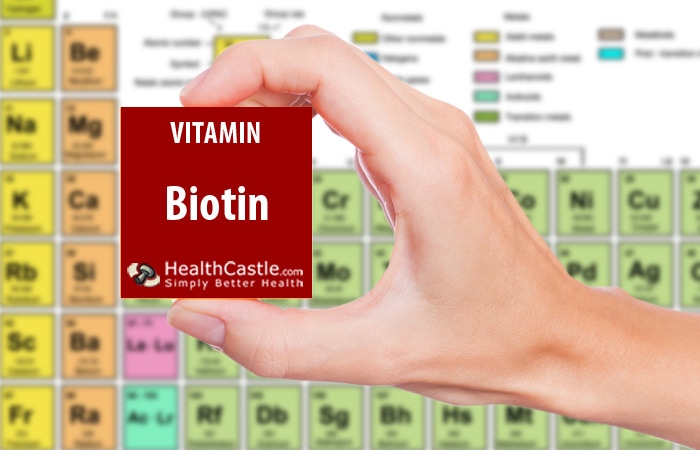
Written By: Carolyn Berry, RD
Title: Registered Dietitian
Alumni: University of British Columbia
Last Updated on:


Biotin is one of 8 B vitamins. All of the B vitamins are water soluble, meaning that the body does not store them but excretes them in the urine.
Table of Contents
The Dietary Reference Intakes (DRI) for biotin are shown below:
| Age Group | Adequate Intake (AI) per day | Tolerable Upper Intake (UI) Levels |
| Adults | ||
| 19 years and up | 30 mcg | *No upper limit is established for this nutrient |
| Kids and Youth | ||
| 1 to 3 years | 8 mcg | |
| 4 to 8 years | 12 mcg | |
| 9 to 13 years | 20 mcg | |
| 14 to 18 years | 25 mcg | |
| Special Considerations | ||
| Pregnant women 14 years and up | 30 mcg | |
| Lactating women 14 years and up | 35 mcg |
Because biotin is water soluble, excessive intake of biotin-containing foods has not shown to be toxic to humans.
Like the other B vitamins, biotin’s main role is to help your body use carbohydrates and protein to make energy. Your body needs it to form adenosine triphosphate (ATP), which every cell of the body uses for energy. B-complex vitamins are also needed for healthy skin, hair, eyes, and liver. They also help the nervous system function properly. Biotin is essential for the formation of fatty acids and for gluconeogenesis, the breakdown of protein for energy during starvation. It is also a critical nutrient during pregnancy because of its role in normal embryonic growth.
Biotin deficiency is very rare, as most people are able to get enough biotin naturally from foods. However, people who consume a large number of raw egg whites over long periods of time and those who have been on prolonged intravenous feeding (paranteral/TPN) without biotin supplementation are at risk for a deficiency. Raw egg white contains avidin, a protein that binds to biotin and prevents its absorption; however, avidin is inactivated when heated.
Biotin supplements have been studied as a treatment for a number of conditions, including hair loss, brittle nails, and improving blood sugars and nerve function in individuals with type 2 diabetes. However, at this time there is not enough evidence to show the effectiveness of biotin supplements for these conditions.
There is very little data on the biotin content in foods; biotin content is not generally included in nutrient databases. Although biotin is found in varying amounts in a wide range of natural food sources in the diet, few are particularly rich sources. Foods with a relatively high biotin content include egg yolk, meat, liver, fish, soybeans, dairy, whole grains, peanuts, and dark green vegetables. Biotin is also synthesized in the gastrointestinal tract by intestinal microorganisms, but not enough for this to be the sole source.
In the United States: The % daily value gives you an idea of how much biotin is in the food you eat. The daily value for biotin is 300 mcg, which is much higher than the DRI for all age groups. It is unclear why the daily value is so high; it may have been established a long time ago and therefore may need to be updated. The FDA does not require that the % daily value for biotin be listed on the Nutrition Facts label.
In Canada: The daily value for biotin is 30 mcg, which is equivalent to the adequate intake for adults. Listing the daily value for biotin on the Nutrition Facts label is optional.
Alumni: University of British Columbia – Carolyn Berry is a Vancouver-based Registered Dietitian, self-proclaimed foodie, marathon runner, and owner of Berry Nourished. Carolyn works in a variety of areas including clinical nutrition, outpatient counselling at Medisys Preventive Health Clinic, as a nutrition tour leader with Save-On-Foods, and in the media, including segments on CBC Television, CKNW and Spice Radio. Through informative and practical nutrition advice and her food-first approach to health, Carolyn fulfills her passion to empower others with knowledge about nutrition so that they can make the best decisions to improve their health. She strongly believes that food should be both healthful and delicious.
biotin, hair, micronutrient - vitamins, skin, vitamin b, vitamins, vitamins - minerals